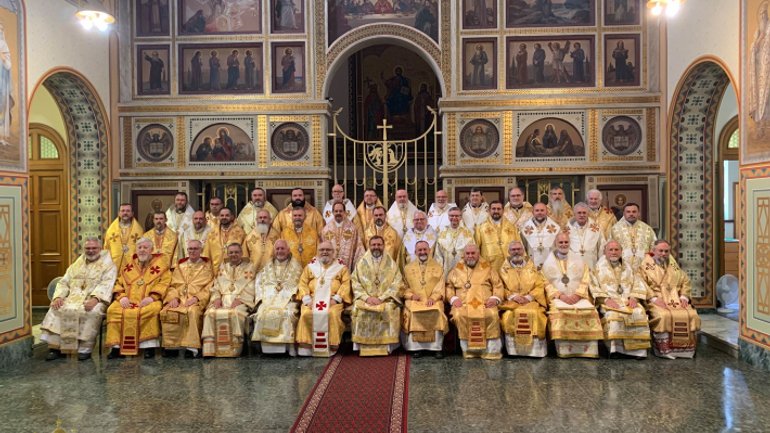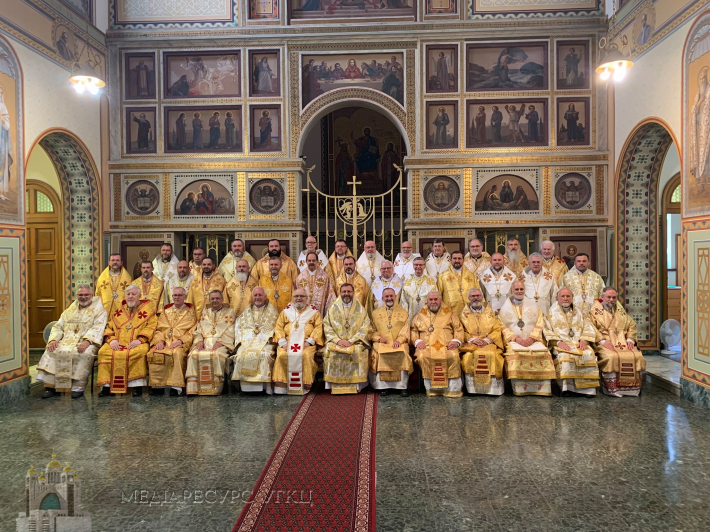The Synod of Bishops of the UGCC beseeches their faithful in Ukraine and the world to unite in the Church

Because we have maintained our roots and did not lose ourselves among other peoples, we have become of interest to them. We enrich the culture and spirituality of our new foreign settlements and invite representatives of other peoples to engage. When Ukraine bleeds, our worldwide Church shares our suffering.
This is stated in the Epistle of the Synod of Bishops of the Ukrainian Greek Catholic Church "Communion and Unity in the Life and Service of the UGCC", following the Synod held on September 1-10, 2019 in Rome. The Epistle was circulated by the UGCC Information Department.

“Thousands of our Church's sons and daughters who were not Ukrainians by origin, have come to love our Christian heritage and have rooted themselves in the tradition of Kyivan Christianity of Volodymyr’s Baptism. Thus, the Ukrainian Greek Catholic Church went beyond her homeland, spoke to different nations in different languages, and became a mother and a teacher for people of many nationalities and cultures,” the Epistle says.
The bishops of the Synod point out that the resettlement of Ukrainians in different countries of the world is the fruit of a thousand-year history of the search, joy and suffering of our Ukrainian people. The reasons for such resettlement are many. Some sought a better fate abroad while others were forced to leave their homeland because of the tumult of bloody wars and devastation. Many have been forcibly expelled, deported, taken or imprisoned away from home.
In their opinion, the modern life of our country is marked by a new powerful wave of emigration, which is why millions of Ukrainians are forming new communities in outermost countries.
Yet even under all these difficult and tragic circumstances, the Church went along with her children, and her sons and daughters have spread her presence onto all continents of the globe.
“Answering the call and mandate of their hierarchs, our faithful were followed by priests, monks, and nuns to carry the Word of God and the grace of the Holy Spirit to the people through the Holy Sacraments, testifying for the active charitable service. Our faithful have built their lives in new lands while preserving their spiritual heritage and nurturing Christian culture. It is no accident that the first thing they would do in the countries of the new settlement was building their churches,” the Synod said.
According to the Epistle, those in immigration testify that for our people, a church, the meeting place of a man and God, was and remains the place where the heart of the Ukrainian community is beating. The Church is the center that rallies the worldwide Ukrainian community.
"For many centuries now, the Ukrainian Greek Catholic Church has been a space of unity for our people, a unity that has bonded Ukrainians of Canada and the United States with their brethren in Latin America and Australia, Western Europe, Kazakhstan, and distant Siberia. According to Patriarch Josyf, the Church allowed them all to "remain themselves" while being far from home," the bishops emphasize.
Today, the bishops of the Synod note that the UGCC is aware - the Church is no longer local. It is global, both Ukrainian and multinational. “This, however, is not due to our geography of residence, nor to public organizations or human institutions, not because of the diverse experience or the community structure. We owe all of this to the inner unity of our Church,” the Epistle states.
It should be noted that the question of unity was the prime subject of the Synod of Bishops in Rome.
In their Epistle, the members of the Synod said: "The Church is a community of people gathered from all over the world by Our Lord Himself." According to the Epistle, today we can testify that "when Ukraine bleeds, when our best sons and daughters give their lives for her, when millions of people are forced to leave their homes, when many Ukrainians are imprisoned, and as prisoners of conscience, suffer torture in the enemy’s hands, when there are thousands of dead and tens of thousands of wounded, when almost entire Ukrainian society is affected by the war, our worldwide Church is suffering with us."
And “when our priority is to proclaim the Gospel of Christ and to save and sanctify the souls of men in the name of God’s truth, when we need to protect human dignity, the rights of Ukrainian migrant workers in any country of the world, then our entire Mother Church, our bishops, the clergy and the laity are rallied to be the voice of those deprived of it. When the pastoral needs of our faithful in Australia or the United Kingdom, Poland or Canada, Argentina or Kazakhstan are to be assured, the clergy and monasticism go on apostolic journeys to proclaim the Gospel of Christ to the very edge of the Earth."
The bishops of the Synod emphasize that the Holy Eucharist is the pinnacle and the deepest manifestation of the unity of the Church of Christ and her nature. Eucharistic bread is a tangible sign and symbol of the Church unity.
The communion, the unity of the Church of Christ, which is her very essence, is manifested in her pastoral service. “Our testimony for the Church is true when the priority of our service is the salvation of souls, the union of a man and God in the community of God's children. Any deed of a member of the Church that contradicts this purpose, such as trying to disassociate from the community, to focus solely on one's own needs or the needs of one's parish, diocese or country, attempting to emphasize some presumed superiority over others, will always be condemned as something non-ecclesiastical, unnatural and incompatible with the Church.









